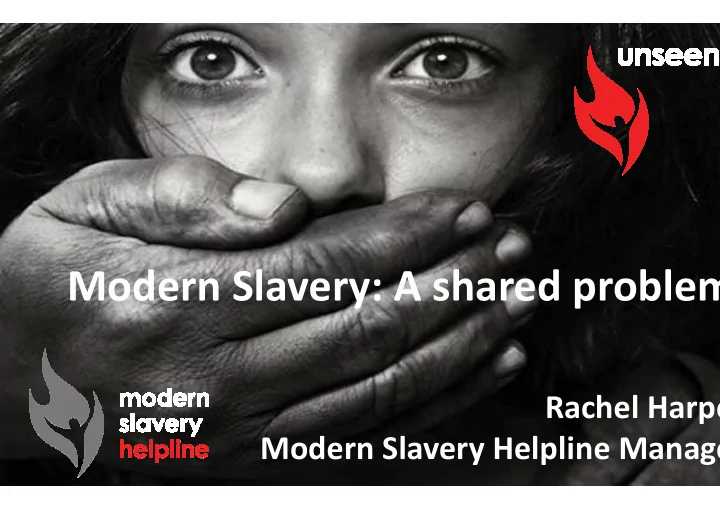

Modern Slavery: A shared problem Rachel Harpe Modern Slavery Helpline Manage
Unseen: Working towards a world without slavery • Supporting survivors and potential victims of slavery; men, women and children • Informing stakeholders; by providing training and awareness-raising, including with businesses and through secondary schools • Influencing systemic changes; by working with the UK and international Governments We also run the UK-wide Modern Slavery Helpline
First principles • Collaboration is key • NGOs are not and should not be quasi police • Multi stakeholder partnerships are vital • Don’t forget this is all about the money – it is an illicit commodity trade • We won’t arrest or prosecute our way out of this • Funding is scarce – so we need to use it wisely and strategically
Survivor Impact • When expectations are not met , or the case is not handled professionally, this has a negative effect on our client’s trust in us, as well as agencies. • This then changes our client’s perspective on the advice we provide, as a support agency, and can affect levels of trust . • This is a particularly important issue because of the background of all our clients, many of whom put their trust in others and resulted in being taken advantage of and being exploited .
There are many cogs…… Statutory agencies – Helpline Health, Las, and other DWP NGOs Law Enforcement agencies Potential victims Businesses Public Government
UK-wide Modern Slavery Helpline • UK-wide - we also take international calls 08000 121 70 • Confidential and independent • 24/7, 365 days a year • Fully trained specialist staff • Translation services • Calls from potential victims, businesses, the public and statutory agencies, including first responders for information, advice, and support • Resource Centre – directory of services • Referrals to the police, NGOs, and local authorities • Central point of contact for all NCA campaigns and many police and other partner campaigns • Publish aggregate data
In 2 years….. Over 10,000 calls/webforms/app submissions Over 2,800 cases of modern slavery recorded Over 11,000 potential victims indicated Over 120 nationalities Over 3,000 referrals to police and safeguarding (covering all police forces in the UK)
uarterly Reports from the Helpline • Broken down by police force region, type of MS, number of PVs indicated and victim demographics gender, age of PVs; number of referrals made to police (and local authorities)
Unseen App
Reaching insular communities manian Hindi elsh Vietnamese banian Chinese lish Punjabi ovakian Hausa thuanian Yoruba tvian Arabic ngali Bulgarian rdu
orrelation with Awareness Campaigns, Media
Across Hertfordshire Constabulary orce region, Hertfordshire county Over 135 calls/webforms/app submissions Over 50 cases of modern slavery recorded 155 potential victims indicated Over 40 referrals to police and LA
A victim’s perspective Vulnerability comes in many guises Significant barriers to seeking help Afraid of authorities Physically and psychologically abused Fear of retaliation for them and family Unable to speak English No understanding of worker rights
Engaging with victims effectively Complex – look beyond the obvious. Getting the full picture takes time cared of authorities. First contact is so important. Cosy, Comfortable oom lain clothes, no uniforms Won’t necessarily recognise themselves as victims Won’t necessarily divulge full story; Inconsistent story Non-Judgemental Conversations based in an understanding of trauma Manage expectations (length of investigations/prosecution/process) Get a trusted, confidential translator Interview the Potential Victim away from the Potential Exploiter Offer Helpline literature – in their own language for future use
Needs: Trainings for all frontline professionals, not just select teams Public awareness campaigns with a clear call to action Prevention in schools: sexual, criminal exploitation Streamlined referrals into NRM Services, Support for victims outside of NRM
Thank you
Recommend
More recommend